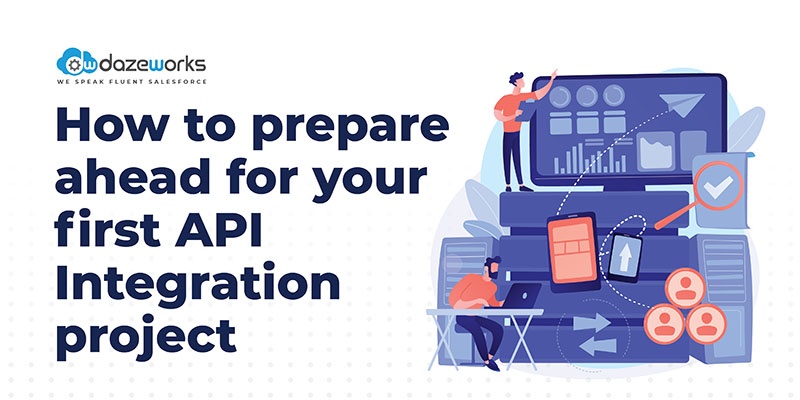
How to Prepare Ahead For Your First API Integration Project
minutes read
APIs are becoming an essential part of businesses who embrace digital ecosystems. Infact 85% of them consider web APIs and API-based integration fundamental to their business strategy and continued success. Early adopters of APIs who understood their business value are now witnessing unprecedented growth and ROI. This proves why Salesforce has generated 50% of its revenue through APIs as revealed by a Harvard Business Review article.
If you’re looking to leverage APIs as your organization’s digital transformation enabler, it’s important to create a comprehensive API integration plan. Consider the following five steps while planning your first API integration project.
Understand Business Goals
Before focusing on the technical aspects, first consider the business implications of your API integration project. Although it is an important step, many organizations do not invest their time into it considering it as a ‘developers’ project’. The first step here is to establish goals that are aligned with your business vision and how you can measure success.
Here are some examples of KPIs to consider before and after implementing an API integration project.
- Time of development
- Uptime
- Speed to market.
- Cost of operations
- Direct revenue
- Customer churn rates.
- NPS (Net Promoter Score)
- API adoption and retention
We always ask our customers to start with short term and doable goals and add-on from there. Ask yourselves these questions as starters:
- Who will make use of the API?
- What is the current problem that exists within your systems and how can you solve them?
- What day-to-day tasks need to be completed to reach the ideal end goal?
- What are 5 main KPIs to be considered while implementing APIs?
Pull in Key Stakeholders
After identifying your key stakeholders, whether its developers, partners, or other resources of your organization- you need to make sure they are on the same page regarding your first API integration project. If it’s a bigger organization, you will have to congregate numerous teams to participate and agree on your API strategies. Either way, they should understand the benefits of implementing an API and how better they can streamline their operations. Talk to them about the business objectives that you have in mind and encourage them to be an active part of the project. Put forward the 5 key KPIs that you’ve defined so that they get the sense of business value derived from the APIs. This will help all of you move as a single unit.
Analyze Your IT Environment
Before kicking off your API integration project, it is highly recommended that you understand your organization’s data architecture. Analyze how information flows and whether everything is in its rightful place before sharing it to your developer group. For an API project to be successful, both the business and IT teams need to work hand in hand and ask the right questions before beginning. Some examples here would be:
- Are there any existing active software licenses?
- Where is data residing at the moment- a CRM or an ERP?
- How will you access data from multiple sources?
- What are tools used by departments for handling data
- Are there any chances that the applications and systems are disconnected?
- How advanced is the IT infrastructure currently?
- What methods are in place to ensure security best practices?
- Are there any public APIs in use in any of your instances?
Understand the Ecosystem and Integration Capabilities
Now that you have a thorough understanding of your IT infrastructure, the next step is to analyze what systems need to be connected to your APIs. Identify legacy systems, data and application silos and analyze what methods will work best and what may go wrong while integrating these systems to the APIs. Some of the existing systems may not require to be integrated while some of them may require careful attention as they are exclusive to a department.
Assemble Your Resources
Once you have defined your business objectives and created an execution plan for API integration, the next step is to hire an expert team who will execute your strategies. You need to put together a team who thinks more from the business side of implementing an API rather than treating it as a technical project. Ideally an API led integration team should include developers, product managers, designers, an architect and a QA. Do you have enough resources to fill these roles or will you be able to give extensive training to your team members? Or do you need to completely outsource the project? There should be definite answers to these questions.
Would you like to create a digital ecosystem with APIs? Get in touch with our team to discuss your business requirements and we will assist you in devising a customized execution plan.
Reference:
